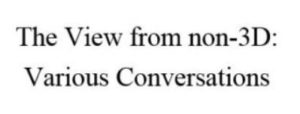
Saturday, October 6, 2012
I was forgetting. I got a sense of Papa’s fear of death as the saying of overpowering strength that would come sooner or later and couldn’t be overcome. It could be fought, and premature death could be faced, but it was inevitable and it colored all of life with a hopelessness if you looked it in the eye as he did.
So now, Papa, answer me this. How did killing things help you deal with that fear? You said, more than once, but I have never understood.
I said that the dealing of death was our way of dealing with it. By dispensing it, we overcame our own fear of it.
Yes, but I don’t understand that.
We all fear death. But some of us are acutely aware of that fear because we are acutely alive. We are alive to that fear as we are to the rest of life. So we must actively deal with it.
And rejoicing in another creatures mortality does it?
No, it isn’t that. By dealing death you are reminding yourself that death is life. There can be no killing something that isn’t alive; there can be no living that isn’t destined to end in death.
I still don’t get it. I’m trying.
Don’t sanitize death or our fear of it. We may have faith but we don’t have knowledge of what’s coming, and if death is not followed by something, then it is pointless and life is pointless.
And in your time there was no knowledge of the world beyond.
That’s it exactly. That’s why I clung to Catholicism as best I could. I sensed it used to know something, and I could see that it gave something to those who believed in it, but I couldn’t, really, I was too complicated, and I had no source of first-hand knowledge. But my parents’ world was clearly too hollow. They didn’t really have that fear of death, but only because they weren’t as alive to it.
This is all implied in all your work, isn’t it?
More than it could have been if I had tried to put it there consciously. The clergyman and the hanged murderer in “in our time,” for instance. You see a wider meaning to it now than I did at the time; I put it there because artistically it somehow fit – but the reason it fit is because it fit into a pattern larger than what I knew while still in my 20s. I put it in for its own reasons, but it looked to me like I put in for my artistic reasons, which was true but not as true as I thought, because it was bigger than I could comprehend.
So to return to the question of dealing death in order to deal with the reality of our own death?
Perhaps it is as simple and as mysterious as this: In dealing death we identify with the God that kills us, rather than with ourselves as slaying victims. For the moment, but it is an addictive sensation.
Hunting, different from fishing?
Fishing is outwitting, outfighting, outmaneuvering. Hunting is more action at a distance, there is more of the godlike ability to slay and less of the physical struggle. If you shoot an elk, you have killed it, but you didn’t have to wrestle it. If you land a marlin, you have killed it, yes, but only because you had to kill it in order to win the long one-to-one combat. Different orders of things.
And bullfights?
In watching the bullfight, you identified with the death-dealing torero, the death-dealing bull, and the presence of death as itself a separate entity. There was the artistry of it, the ritual, the pageantry, and all of that served to heighten the solemnity of the event. Even the comic elements did that, by contrasting with the tragic and thereby making you more acutely aware of it. But it was the presence or absence or degree of courage and grace of the torero in the face of possible death and the giving of death that was the nub of it. If this doesn’t give it to you, I don’t know what else to say.
I think I do get it. You said somewhere, in the absence of war, you could go to a bullfight.
Yes. It wasn’t for the sake of enjoying something suffering. It wasn’t for the sake of vicariously killing something. It wasn’t even for the sake of identifying with the torero’s grace and courage and skill. It was to be alive to the presence of death so that I could be that much more alive to my own life while I was living it.
Would you go to a bullfight in the afterlife?
Like Valhalla, you mean, where warriors contend again, for the fun of it without the mortal results? Let me try an analogy or two. Would you today get all choked up about whether your high school team was going to win a game? Would you experience thrills in a bump car rink? Would a merry-go-round send you into screams of delight?
Awareness of death is different after you remember doing it.
Sure. How else could it be? If we didn’t forget before entering life – and not everybody does – life would be a very different experience.